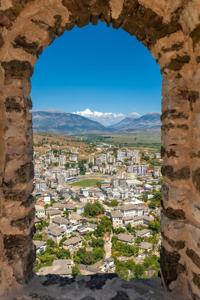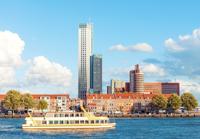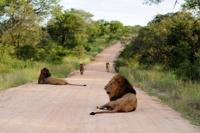It’s a travel paradox: Many of us profess to want “hidden gems,” “best-kept secrets,” and destinations “off the beaten path.” And yet, it’s estimated that 80 per cent of travellers converge on 10 per cent of the world’s tourist destinations. Here, some expert advice on how to avoid going where everyone else is heading, too.
Rethink hot spots in the high season
Avoiding crowds isn’t just a matter of where you go, but when. “Being in the right city or destination at the right time, it really does make a difference,” says Jamsheed Pocha, co-founder of the Pelican Club, a Toronto-based luxury travel planning company and a Virtuoso member agency. Take, for example, Italy’s perennially popular capital city, which is set to be even more crowded than usual this summer.
“Everybody’s talking about how this year is the Jubilee in Rome,” says Pocha, referencing the major Catholic event that started on Christmas Eve 2024 and will continue until Jan. 6, 2026. The Vatican expects it to draw an estimated 32 million pilgrims from around the world. By comparison, Vatican City attracts closer to seven million visitors in a more typical year.
If you’re not intent on joining the Jubilee, “that’s a place to maybe avoid, especially in June, July and August, when it will be extremely busy,” says Pocha, highlighting Switzerland and Austria as worthy summertime alternatives.

A view from the Castle of Gjirokastër, Albania. Many tourists miss the country, which remains budget-friendly.
Consider the ‘ignored’ places
They tend to be more affordable, too. For example: “Albania is one of Europe’s best-kept secrets,” recommends Matt Kepnes, also known as Nomadic Matt, author of the new book How to Travel the World on $75 a Day.
“Though it increases in popularity each year, tourists largely ignore the country because many still think of it as a post-Communist backwater — as if the world hasn’t changed in the past 30 years. Yet Albania is full of friendly people, incredible history and food, and (varied) landscapes, from Adriatic beaches to stunning gorges, lakes and forests,” adds Kepnes, suggesting the capital city of Tirana, as well as Shkodër in the north, and Gjirokastër in the south. “Plus, it’s very budget-friendly. You can easily get by on $75 (U.S.) per day without sacrificing comfort.”

The Rosewood Miyakojima just opened on an island in the Okinawa archipelago, a quiet, beachy part of Japan that’s close to Taiwan.
In trending countries, stray from the predictable
“We’ve had so many requests (for) Japan, and so many of our clients have travelled there,” says Pocha of the Pelican Club. The stats back up the country’s fashionable status: According to the Japan National Tourism Organization, nearly 36.9 million international travellers visited in 2024, handily beating pre-pandemic figures and setting a new record.
If Japan is on your wish list, venture beyond Tokyo, Kyoto and other obvious favourites. Last year, the Hokuriku Shinkansen bullet train was extended to add multiple new stations in the Fukui prefecture — a part of Japan that tourists usually overlook. The area isn’t lacking attractions: It’s the fossil-rich dinosaur capital of the country (with a dedicated dino museum to prove it), and it’s also home to a historic Zen landmark, Eiheiji (“the temple of eternal peace”), opened in 1244.
Another “off-the-beaten-path” destination is the Okinawa archipelago — south of Japan’s mainland, and closer to Taiwan. Far from Tokyo’s neon streets, it’s all white-sand beaches, coral-reef diving and subtropical weather. Here, the Rosewood Miyakojima opened on Miyako Island this month. “It’s a stunning property and has built the resort experience out there,” says Pocha.

Rotterdam is a second-city alternative to Amsterdam, which has taken measures to combat overtourism.
Detour to second cities
In recent years, Amsterdam has taken multiple measures to curb overtourism, announcing restrictions on hotel development (a new one can’t be built unless another closes) and plans to shutter its central cruise port. Instead of heading to a place that would rather be less popular, consider the Netherlands’ second city.
“OK, let’s get this out of the way: Rotterdam doesn’t have any canals, or houseboats, or really the same old-world charm as Amsterdam,” says Tim Johnson, a Canadian travel writer who has been to more than 100 countries (and counting). “But instead, it offers ultra-modern architecture, and so many Dutch treats in a market that feels like it’s from the future (Markthal). There’s a bustling harbour filled with boat tours, and lined with former warehouses that are now shops and restaurants.”
Similarly, if you don’t want to jockey with the masses in Paris, try Lyon. “They are two very different cities, but both have an amazing cathedral, cobblestone streets and a beautiful river (two actually in Lyon),” says Johnson. “And even Parisians will tell you — some of them anyway — that Lyon is France’s culinary capital. It was home to Paul Bocuse, called the ‘pope of French gastronomy.’ Today, the vast food halls here bear his name.”

For an uncrowded safari experience, choose a responsible tour operator that works to conserve private land.
Book your tour operator wisely
You may expect that adventuring out in the wilderness would automatically mean escaping the crowds, but even on safari in Africa, you could be spotting lions and leopards alongside a lineup of jeeps. “There is overtourism in some national parks. When you’re in Kruger (in South Africa) or the Serengeti (in Tanzania), and you’re staying in one of the lodges — there could be 15 different lodges in a certain area, all sending out multiple vans at the same time to see the same things,” says Pocha.
Picking the right, responsible tour operator makes all the difference. He favours companies with conservation specialists that look after land associated with them. Operators offering a more exclusive, authentic safari experience, according to Pocha, include Singita, which has a 33,000-acre private concession within Kruger National Park, and Wilderness, which works to conserve over 6 million acres of private land across eight countries in Africa.


















To join the conversation set a first and last name in your user profile.
Sign in or register for free to join the Conversation